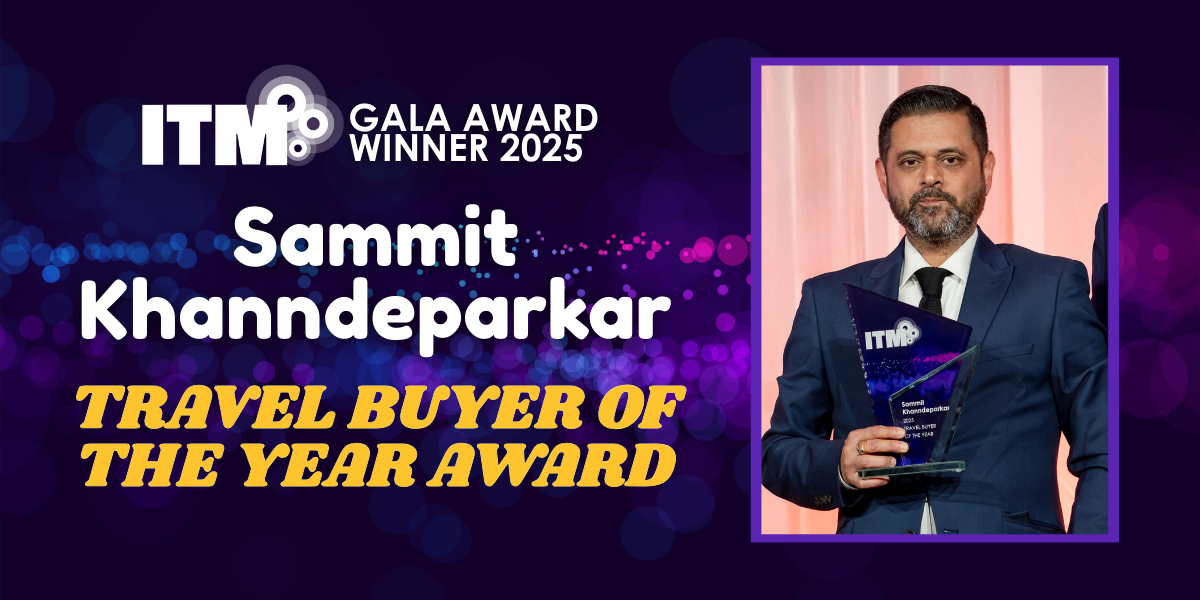Sammit Khanndeparkar: Gala Awards 2025 Winner

Sammit Khanndeparkar, Head of Global Travel at LSEG, and Winner of the ITM Travel Buyer of the Year Award 2025 at our Spring Conference INSPIRE
What did winning this award mean to you, both personally and professionally?
Winning the ITM Award for Best Travel Buyer was a proud and humbling moment for me. Professionally, it served as recognition of the strategic work I’ve led over the years – consolidating global travel programmes, enhancing supplier partnerships, and driving measurable value for my travel programme across complex organisations. It validated my ability to balance commercial performance, user experience, compliance, high CSAT scores, and sustainability – all while navigating a constantly evolving travel landscape.
Personally, the award was incredibly fulfilling. It reflected that the long hours, resilience, and commitment to doing things the right way were worth the effort. It also reaffirmed my belief that relationships, data, and integrity are at the heart of effective travel management. More than anything, it inspired me to keep raising the bar – not just for myself, but for my team and the organisation I serve. It was like winning an Oscar or a Grammy.
What do you find most rewarding about your role as a travel buyer?
What I find most rewarding about my role as a travel buyer is the opportunity to create real, measurable impact – both for the organisation and for the people who rely on travel to do their jobs effectively.
It’s incredibly fulfilling to design programmes that not only deliver cost efficiencies and policy compliance but also enhance the end-user experience and support broader goals like sustainability and risk management. I enjoy the strategic challenge of aligning supplier partnerships, technology platforms, and internal processes to drive long-term value. But just as importantly, I value the human side – listening to feedback from travellers, solving pain points, and building solutions to ensure their experience is smoother and safer.
What do you see as the biggest challenge facing travel buyers in the next 12 months, and how are you preparing for it?
One of the biggest challenges travel buyers will face over the next 12 months is balancing cost control with sustainability, air content access, traveller wellbeing, and evolving compliance requirements – all while navigating a volatile supplier landscape and rising geopolitical and economic uncertainties.
Buyers are expected to deliver more value with fewer resources, manage tight budgets, ensure duty of care across global operations, and support ESG targets – especially around Scope 3 emissions. At the same time, they must respond to evolving traveller expectations around flexibility, digital experience, and wellbeing.
To prepare, I’m focusing on data-driven decision-making, supplier consolidation, and smart use of technology – especially Concur T2. I’ve implemented CO₂ tracking dashboards and built governance playbooks. I’m also investing in strong stakeholder alignment to ensure my travel programme is not only efficient but future-proof. The goal is to move from tactical cost control to strategic, resilient travel management that supports the business while being agile enough to respond to constant change.
What’s one thing about your role in business travel that never fails to make you smile?
One thing that never fails to make me smile is hearing directly from a colleague or executive who says, “That was the smoothest travel experience I’ve ever had.”
Whether it’s a last-minute trip that was flawlessly supported or a complex itinerary that went off without a hitch, knowing that the journey was stress-free always brings me a sense of purpose and pride.
If you could change one aspect of the business travel industry, what would it be and why?
If I could change one aspect of the business travel industry, it would be the lack of end-to-end content integration across a single platform and among all providers – from booking and expense to sustainability tracking and duty of care.
Right now, travel buyers operate in silos, stitching together data from multiple systems and sources that don’t communicate with each other. This leads to inefficiencies, blind spots, and missed opportunities.
Why? Because this fragmentation holds back our ability to make agile, informed decisions – especially in areas that are now critical, like carbon impact and regulatory compliance. A more connected ecosystem would not only make travel programmes more efficient and transparent, but also elevate the strategic value of travel within the business. It would shift us from being reactive managers to proactive enablers of sustainable, secure, and seamless global mobility.



